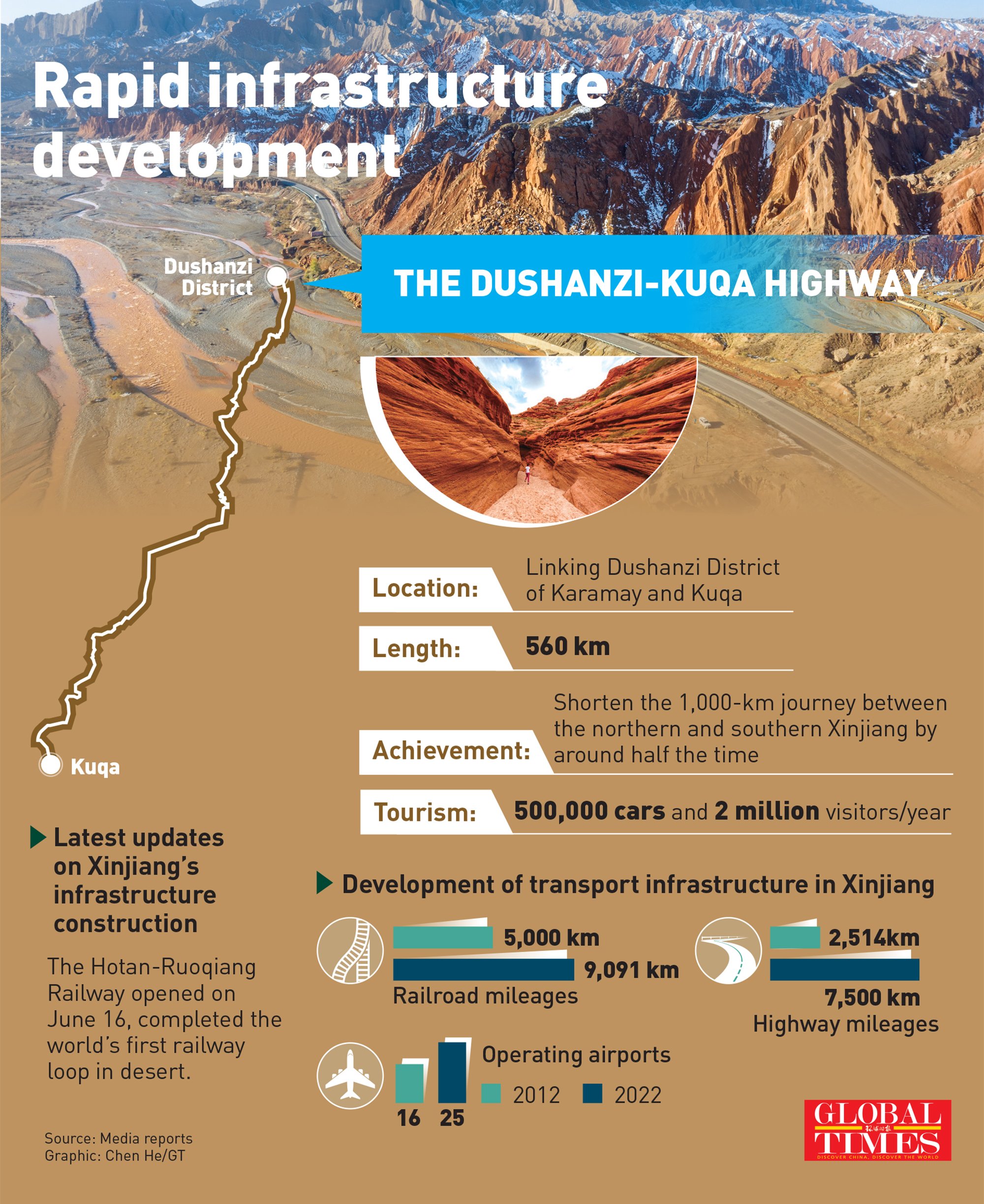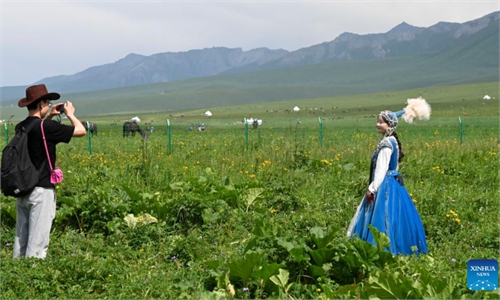
Duku Highway. Photo: VCG
Xinjiang tourism has been triggered by loosen travel policies and local region's incentive measures, and several travel industry insiders said the improving transportation network gives a further boost to local tourism.
"This is my fourth travel group since the beginning of June, and I have not rested for one day," a tourist guide surnamed Ding told the Global Times on Friday. Ding is currently guiding a travel group at the Duku Highway in Northwest China's Xinjiang Uygur Autonomous Region.
Duku Highway, connecting Dushanzi in the northern area of Xinjiang and Kuqa County in the south, can only be used by cars with less than seven seats, and travel buses must be replaced by small cars, which causes a short supply of rental cars. We need to book at least three or four days in advance, he said.
The 561 km highway, which was opened on June 10 this year and runs through the majestic Tianshan Mountains is only open from June to October every year and is believed to be the most beautiful route in China.
In recent weeks the highway has experienced a significant increase in traffic, with vehicles pouring in from all over the country, especially self-driving cars, Ding said.
The busy highway is only one of the many examples in Xinjiang to see how tourism is recovering as China finetunes its COVID-19 prevention measures and Xinjiang takes measures to boost the local tourism industry. Apart from Xinjiang's highway, railway and airline systems are providing more choices for tourists.
The Urumqi Railway Bureau on June 28 and 29 launched two round trips by train in northern and southern part of Xinjiang. Two more New Orient Express trains, a deluxe hotel-like long-trip train, began operations in July. This year, Xinjiang's railway system will run a total of 102 special trains for tourists.
Xinjiang's third highway through the Taklimakan Desert has opened to commercial traffic on June 30, providing another option for self-driving tourists. More airlines are also increasing flights to the region.
An employee surnamed Liu from travel agency 7sea told the Global Times on Friday that the booking for New Oriental Express in July is "done," and new booking is only available from August.
The development of transportation facilities has provided convenience for tourists to travel to Xinjiang, Zhang Mingyang, a research fellow from Tongcheng Research Institute, told the Global Times that travel packages lasting three to five days are also welcomed by travelers this year.
Data from Tongcheng Travel shows that since mid-June, Xinjiang's tourism search popularity has increased by 78 percent month-on-month. The prices of Xinjiang-related hotels on the platform have risen significantly compared with the beginning of June, and it is difficult to find a room in hotels and homestays around some popular scenic spots.
In addition, the sales volume of tickets for scenic spots in Xinjiang increased by more than 300 percent month-on-month, and the sales volume of products such as air tickets and vacation routes also increased.
According to data from Tuniu.com, the number of tourists to Xinjiang destinations in late June increased by 260 percent compared with the first 10 days of June.
79 percent of bookings are from cross-provincial travel, and the top three orders are mainly from Jiangsu, Guangdong and Shanghai. Excluding the travel demand for separate bookings of air tickets and hotels, Xinjiang group travel orders accounted for 88 percent in terms of the package travels.
As Xinjiang precisely relaxed the epidemic control measures for tourists from other provinces, the number of travelers is increasing, Dahui, an owner of homestay in Kashgar, told the Global Times on Friday.
I have 13 rooms in my homestay, and the rooms have been fully occupied from the end of June till the end of July, he said.
His case isn't unique, he said the average occupancy rate in the region is around 80 percent, which is a big jump compared with the previous year.
But he said, most of the tourists are from Xinjiang, and he is waiting for more tourists from other cities such as Beijing and Shanghai.
Data from travel platform Tujia showed that Xinjiang's homestay bookings increased rapidly during the summer. The number of advance bookings in July increased by nearly 5.5 times from the previous month, an increase of nearly 80 percent compared with July 2021.
Regions such as Ili, Urumqi, Altay and Kashgar are the top four most popular areas for homestay bookings, and the homestay orders all exceeded the level of July last year, Tujia said.

Graphic: GT



